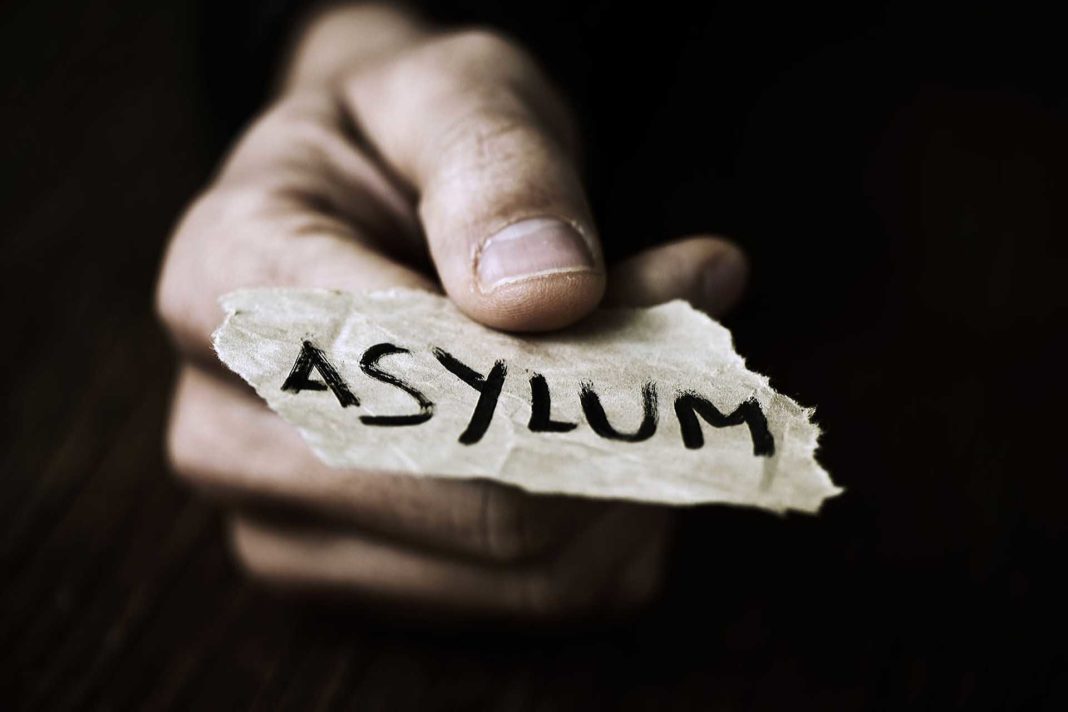“I know I should be grateful,” says “Kate” (not her real name) as she starts crying. “And I am. It’s just…” She bursts into tears.
“I’m sorry.”
Kate is an asylum-seeker. For the past year, she has lived with her young daughter in a Direct Provision centre in Munster.
Asylum-seekers are served their food at set times and, until very recently, were not allowed to cook for themselves. In some centres, new kitchen facilities have been opened. However, any food you cook, you buy yourself. On a weekly allowance of €19.10, you won’t splash out often and will instead – for the most part – eat the food on offer at mealtime.
“The food,” Kate says, “can be disgusting. Tasteless. You could get mincemeat Thursday, Friday, Saturday and Sunday. Over-cooked, bland.
“Now there’s a facility for cooking, the food quality, which wasn’t great to begin with, has deteriorated.
“And if you don’t like the food on the menu, then tough, go hungry.
“I am grateful,” she insists, wiping her eyes. “I am. It’s not good here but it’s still a lot better than what we left.”
When Kate arrived last year, she applied for asylum. Her claim was rejected and she appealed. Until the recent introduction of the International Protection Act 2015 which the Government says will streamline the asylum process, the cycle of appeal and rejection could continue for years, all the time haunted by the spectre of deportation.
“I count the days until – please God – I get my papers. Look, as long as I know my daughter is okay, I can manage. She is in school and she was telling me about the homeless Irish people and she started crying that they might not have food or a bed.
“I do believe one of the greatest strengths one can have is gratitude.”
Kate’s complaints about the quality of food in Direct Provision chime with what I had been previously told. Earlier that day, I called to another centre. There, I met women who alleged the food they received was of a very poor standard.
“If we have chicken today,” I was told by one, “we have the same chicken tomorrow and the next day, the same chicken in sweet ‘n’ sour sauce. Or if it’s beef on Monday, the same beef on Tuesday and beef stew with the same beef on Wednesday.”
I asked them if they had complained to management and I was told in hushed tones that they dare not cause a fuss, lest they be moved to another centre, or worse. They told me they all have deportation orders hanging over them and have had friends who were woken in the night and whisked away, children and all, under Garda escort and put on a plane back to their countries of origin.
Direct Provision centres are run by private firms which receive in the region of €50 million per annum in State funding. They are overseen by the Reception and Integration Agency.
I asked the Department of Justice – which is ultimately responsible for RIA – for a comment on allegations that asylum-seekers are fed food of a low quality. In response, I was asked if there had been a complaint.
When I said that the residents were too frightened to make a complaint, I was told the Department could not possibly comment if there had not been a complaint.
I then asked if the Department of Justice would comment if there actually had been a complaint and was told that if there had been a complaint, then of course the Department could not comment.
So, then, no comment if there isn’t a complaint and no comment if there is.
I was told: “RIA has a complaints procedure which resolves to deal with problems quickly and efficiently.
“RIA oversees a comprehensive and detailed inspections system of asylum seeker accommodation. Inspections are carried out by an in-house inspectorate within RIA and also by an independent company with expertise in fire and food safety.”
All of which would be fine, were not people in Direct Provision too terrified to complain.
The International Protection Act 2015 came into effect at the start of this year and introduces a “single procedure” which will – according to the Government – speed up the asylum process and prevent the sort of limbo where applicants are locked in an uncertain cycle of rejection, appeal, rejection and appeal.
The “single procedure” allows applications for refugee status and for subsidiary protection (protection given to someone who would be in serious danger if returned home, but who may not fit the strict definition of a refugee) to be considered in one application. The United Nations High Commissioner for Refugees (UNHCR) welcomed the new system, saying that it should “dramatically cut the length of time asylum-seekers spend in Direct Provision centres”.
However, not everyone is so confident.
Dr Jacqui O’Riordan of UCC’s Department of Applied Social Studies, is sceptical of the single procedure and is concerned it will just lead to more deportations.
“It makes no sense that you apply for refugee status and subsidiary protection at the same time,” she says. “Also, there are clauses in the Act, for instance, one that narrows the definition of the family to parents and children under 18, which will only bring more heartache.
“I spoke with a woman over Christmas who has three children here in Ireland with her and an older child who is now 16 or 17 back home. The likelihood for her and others in her situation is that the older children will not be recognised as family.”
She worries too, that other provisions of the Act make it more difficult for applicants to appeal.
‘MONEY MAKING SYSTEM’
Lucky Khambule is a South African granted refugee status in November. Prior to that, he says: “I wasted three years and nine months of my life in Kinsale Road.”
He is similarly unimpressed by the new system.
“It looks like it’s addressing the delay in processing asylum applications,” he says, “but in reality it will make it easier to deport people quicker.”
Now he’s no longer in Direct Provision, Lucky feels a part of society and intends to apply for Irish citizenship.
“I recently took a walking tour of Dublin,” he says. “It covered 400 years of Irish history and it showed how much Irish people have suffered. The treatment of children, what was done to the poor women in Magdalene Laundries, and now you have Direct Provision. This is a money-making system which profits on human suffering, right here in Ireland.”
In 1999, Taoiseach Bertie Ahern issued an apology to institutional child abuse victims, saying: “There was a reluctance to admit that as a State and a society, we failed many of the children of the nation in allowing them to be incarcerated in places where they were not cherished, but poorly treated.”
In 2013, Taoiseach Enda Kenny apologised for the Magdalene Laundries, saying “the reality is that for 90 years, Ireland subjected these women and their experience to a profound and studied indifference.”
Former Supreme Court judge, Catherine McGuinness predicts a future Taoiseach will publicly apologise for the damage done by Direct Provision.
This time, we won’t have the luxury of pretending we didn’t know.
But this is Ireland. We always knew.
DIRECT PROVISION: How We Got Here
Ireland has warehoused asylum-seekers in Direct Provision centres since 1999. Direct Provision was introduced as a temporary, six-month, solution when annual asylum applications were 10,938. Applications peaked in 2002 at 11,600.
2015 saw 1,448 asylum applications.
Despite the original intention that asylum-seekers would only spend approximately six months in Direct Provision, many people spend years in conditions which have been condemned by the UN and international human rights groups.
Direct Provision gives asylum-seekers their bed and board and prohibits them from working. Asylum-seekers get €19.10 a week. Children get €15.50.
Currently 4,300 people are in 34 Direct Provision centres across the State. One third of those in Direct Provision are children; 55% have been here for five years, 20% of that for seven years or more.
Direct Provision centres, which include former hotels, hostels and a mobile home park, are run by private contractors who receive in the region of €50 million per year in State funding. Direct Provision is big business. One wonders whether the companies running it have ever donated to Fianna Fáil, Fine Gael, Labour and the PDs.
Until now, parents have not been allowed to cook for their children and many they feel they have lost their sense of independence. What’s worse, notes Sue Conlon, formerly of the Irish Refugee Council, is that some children in Direct Provision – crammed into close proximity with adults (and not just their parents), are seeing things they should not see and are replicating behaviour they should not understand.
“We have created a system which infantilises adults and sexualises children,” she says. “This is a recipe for horrors.”
In EU terms, Ireland has a lower than average number of asylum applications per head of capita. According to the United Nations High Commissioner for Refugees, Ireland received 1.4 asylum seekers per 1,000 population between 2010 and 2014. The EU average is 3.5 per 1,000 and, over the same period, Sweden received 24 applications per 1,000 population.
Ireland only accepts approximately 5% to 6% of asylum applicants upon first application. The European average is somewhere between 26% and 28%.
Ireland is the only country in the EU, other than Lithuania, that does not allow asylum applicants access to the labour market at any stage during the asylum process.
If you visit the Kinsale Road Direct Provision centre, you will not be granted access without an appointment. Rather, you will be turned away due to “privacy concerns”. It’s hard not to find that darkly hilarious when some asylum-seekers are forced to share bedrooms with total strangers.
CASE STUDY: A Death At Kinsale Road
On the evening of Tuesday, August 23rd, 2016, Gardaí were called to the Kinsale Road Direct Provision centre. There they found a 36 year old Korean woman dead in her room. She had been an asylum-seeker living in the centre for almost a year.
She was the mother of a six year old boy. Gardaí told the Irish Examiner that they were treating her death as “a personal tragedy”.
Residents at the centre said the woman had a history of depression, that she had little English, and that she kept to herself.
“Lovely lady, very private, and didn’t choose to mingle with people,” one resident told RTÉ’s Brian O’Connell. “It was obvious that she had issues, but she chose to remain private about them.”
Zoya Zoya, a Pakistani beautician who has lived in the Kinsale Road Direct Provision centre for a year, told the Irish Examiner that fellow residents were shocked by the death.
“She was a very quiet woman. When she came in to the dining room, she didn’t really talk to anyone. She kept to herself. But we didn’t expect she would do something like this.”
Her son was very popular with his neighbours.
“He interacted very, very well with other children,” a neighbour said. “Very sweet and loved his mum dearly. And she loved him as well. You could see. When it came to her son, you could see how much she loved him.”
Brian O’Connell reckons that roughly 90% of asylum-seekers will have suffered from some form of depression.
Direct Provision centres are overseen by the Justice Department’s Reception and Integration Agency.
Sixty-one asylum seekers, including sixteen children under the age of 6, have died in Direct Provision centres between 2002 and 2014.
“While all of these deaths are, of course, tragic, they need to be viewed proportionately and against the background that RIA has provided accommodation for almost 53,000 persons over the course of the 14 years the Direct Provision policy has been in place,” Justice Minister Frances Fitzgerald said last year.








